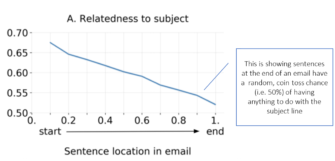“Because It Works, That’s Why.”
Perhaps it’s time to rethink the ‘because it works’ claim so often trotted out in defense of dubious, deceptive fundraising tactics; enter the political email season.
Between April 1st and 19th of 2019 the presidential candidates (at the time) sent a combined 1,730 messages, more than 19 a day, to supporters. In defense or explanation of this is a comment from a writer of presidential political emails, “What annoys you the most in your inbox is probably what’s doing the best for a candidate. The campaigns don’t love everything they send, but it’s hard to argue with what’s raising money.”
Any individual campaign lives in the short-term – weeks or a few months, not years. They have no long-term and the tragedy of the commons is probably beyond any one campaign’s capacity to care given the live or die mentality.
A cautionary note for what “works” is signaled by a Princeton study that has amassed perhap the largest corpus of political emails during the 2020 season, exceeding 250k emails by June of this year and covering a couple thousand campaigns and skewing heavily to federal office. (See earlier Agitator post on the research here).
Researchers coded and analyzed these emails in lots of obvious (e.g. word count for subject line, topic) and non-obvious ways. For example, this chart shows a probability analysis that the body of the email relates to the subject line for fundraising emails. They call this the “pivot to fundraising” technique and they found that towards the end of a fundraising email the sentences are no more related to the subject line than a random sentence from another email. “Pivot” might sound good but” bait and switch” is more accurate.

Another common tactic is the match, familiar to all readers. However, it’s on steroids and HGH in the political season with ludicrous being the only way to describe the multipliers of 8x, 100x, 400x (seriously). Cmon, seriously? A high level Democratic campaign consultant said, “campaigns offering donation matching are usually just allocating money that’s already coming in to cover the match.” You don’t say…Campaign finance laws and their limits on individual giving make most of matching all but impossible in reality so call it a tactic if you must but the better descriptor is fraud.
Most people don’t fall for this nonsense but ‘most’ people isn’t all people and there is strong evidence that older people lack a certain digital literacy needed to see through this ruse. But hey, it works…
The Princeton researchers unearthed a few other highly common, highly dubious tactics to nudge people into opening these emails. These were all loosely categorized under “clickbait”, defined as exploiting cognitive vulnerability to encourage users to interact with content. That doesn’t sound good and the “it works” claim may not hold up so well in a Congressional or FEC hearing (should it come to that) or maybe worse for those involved, a media expose.
But perhaps our favorite bad practice that has been shown to disproportionately confuse older people and those in lower socioeconomic groups is what the researchers called “user interface manipulation”. This includes,
- Obscured Name. The “from” field is hidden or obscured forcing the recipient to open it. Although the email address is not obscured most email clients (e.g. Gmail) don’t display the information before opening. Examples in the corpus include “Articles of Impeachment” and “INCOMING: Trump’s REVENGE”.
- Ongoing thread. This is displaying and formatting the From field as if the recipient has received a new message in an ongoing conversation even though that isn’t the case – e.g. the From line has “Candidate First Name, Me (2)” with the ‘2’ suggesting this is part of an ongoing thread.
- Re: /Fwd: Using these to suggest it’s part of an ongoing conversation even though it isn’t.
Normalizing questionable and perhaps even illegal (e.g. fraudulent) tactics because “they work” ignores a few realities. First, the rampant copycatting of these tactics quickly diminishes any “but-it-works” upside as the novel becomes routine and voters are quickly desensitized. Further, these likely only “work” in the very short term as they are the antithesis of meeting key, psychological needs of autonomy, competence and relatedness that foster and breed high quality motivation.
And finally don’t they have something more compelling to say or provide? The race to the bottom is on.
Kevin
P.S. Don’t forget to register for our Creating Quality Donors From Scratch learning session


